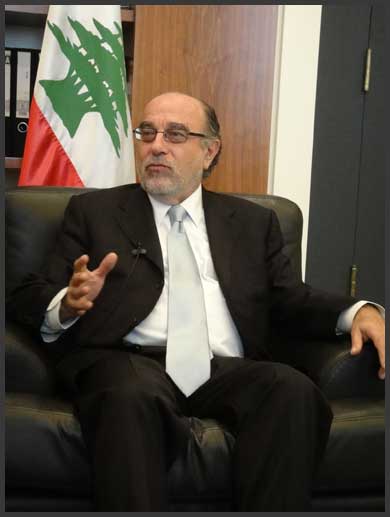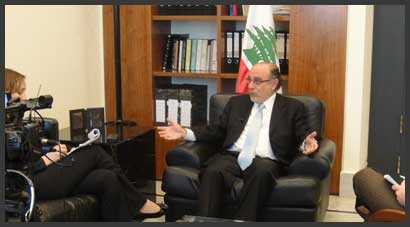Lebanon Foreign Policy
Politics in the middle east are turbulent and Lebanon is often pulled in all sorts of directions. Because Lebanon is rich with diversity this results in a noisy and difficult democracy that we have to navigate through without abandoning our principles.
Lebanon finds itself in a politically complex region. To what extent do you see the situation improving and do you see any signs of progress?
This is a complex region and Lebanon is a complex country. That complicates matters for policy makers and their advisors but it is a blessing as much as it is a curse. Lebanon is a very unique country with a rich mix of groups, cultures, and views squeezes into 10,000 km of beaches and mountains. The politics of the Middle East are very complicated and at times dangerous. As recently as a few years ago Lebanon experienced this in the war of 2006 but since then Lebanon has recovered impressively and has grown despite the world wide recession. In addition to growth we have also experienced a peaceful Lebanon that has attracted people from around the world and this has been a factor in the high growth rate we have had. The current PM realizes Lebanon can still do a lot better than it is doing now even though it is the best among the non-oil rich Arab countries. Our wealth is in the Lebanese people and they will allow us to bridge the development gap we currently face. Furthermore, the need for peace is a very important issue not only for us but for the world; it is everyone’s cause.
How would you characterize Lebanon’s foreign policy? Has it changed recently and what is its direction?
Politics in the middle east are turbulent and Lebanon is often pulled in all sorts of directions. Because Lebanon is rich with diversity this results in a noisy and difficult democracy that we have to navigate through without abandoning our principles. Not everyone sees eye to eye in Lebanon but we are trying to navigate a safe course for Lebanon by taking into account the many facts he cannot change while maintaining the principles and goals he has while keeping in mind both his goals and the interests of the country. Lebanon allows for diversity and expression of beliefs and this isn’t always easy to do. We would like to move towards a more relaxed and comfortable existence where we can continue to create an open environment laden with peace and improve with each generation.
A topic of discussion is the age old stalemate between political parties. How would you assess the political climate in Lebanon and do you see any signs of progress?
There is progress but are we satisfied? The answer is no. In Lebanon we have a people that have done well and continue to do so inside and outside of the country. We are a country with 4 million people and with double that number of Lebanese origin outside of Lebanon and this is a major source of financial strength for Lebanon and adds to our globalized character. We are hoping that the politics and the public sector can rise to the level of the Lebanese people and create the kind of conditions where the people can do what they are doing very well abroad inside the country. We are seeing signs of this in terms of the finances as people are starting to invest in Lebanon and our banking sector is attracting deposits. The banking sector is one of the biggest in the world relative to the country and it comprises 350% of our GDP. People are beginning to realize that this is a good place to invest money and we look toward the future with a lot of optimism and hoping this optimism is matched by progress on the regional, political, and security front. As a result of this, we want to see the peace process become a reality soon.
As a senior advisor to the PM what is your vision for Lebanon?
Lebanon is a small country but what is special is the kind of product that results from the cultural and demographic link we have here in Lebanon. This mix has produced Lebanese character, culture, and a way of life and this is very special and is more important than the country itself. There is a lot of liberty here to think and publish compared to the Arab world and this creates an example that is different than other places in this part of the world and we view this as a positive contribute. Locally, we have a long list of things to be fixed that hinder the progress of this country.
“For example, Lebanon is a nice place but it is
shameful that we don’t have a power sector that
gives you power 24 hours a day and this keeps us
from progressing. Until recently bandwidth was so
ridiculously low that people hesitated to relocate
here, especially in businesses where telecommunications
are important.”
Additionally, our long period of having a weak government and unstable environment has been a hindrance and is a priority to add strength and lawfulness. While we have this currently it is lower than we are capable of and needs to be improved upon but this is a complicated, every day struggle. As a coalition government this doesn’t provide a comfortable basis for policy makers. The PM is doing his best towards pushing everyone to achieve these goals, however.
How do you see the questions of privatization, PPPs, and taxes in Lebanon?
Everyone knows the Lebanese are good businessmen and entrepreneurs. It would be ironic if the private sector wasn’t brought into the development of government growth as the engine that can move Lebanon forward. When we talk about privatization we mean bringing in this dynamism and power to serve the public good. PPP are necessary in many areas of provisional public service and it is high on the agenda as here is legislation in parliament to allow this in many sectors where this has yet to happen. The public sector in Lebanon is not exceptional large and has remained relatively small historically. However,
“Lebanon has assumed a lot of debt and
needs to keep its financial house in order as
financial stability is crucial.”
At the same time, taxes should not go up to levels that hinder investment and/or present an undue burden on the people. Right now the tax system is not a hindrance on investing in Lebanon and we are trying to make the tax system for effective and just and the distribution more even. We do not want the tax system to be an obstacle for Lebanese and otherwise to make investments in Lebanon that would improve the standard of living, create jobs, and put Lebanon where we want it to be.

For many years the images people saw around the world in the media about Lebanon have been negative and ugly. Some of this has been reversed now and have depicted Lebanon has a special place that is attractive to both live in and visit. People are interested in tourism, as such. When people experience the diversity and the richness we have here, both new and old, they see what a lively place it is. We want to send this message to the rest of the world because we think we offer a great deal to visitors and investors. We are special and we believe we have a lot to offer as a country to both the region and the world.